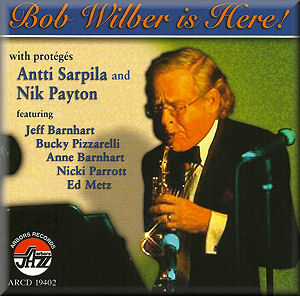1. Vampin' Miss Georgia
2. Only the Lonely
3. Lou's Blues
4. Dreamy
5. The World is Waiting for the Sunrise
6. Intermezzo
7. Yes, We Have No Bananas
8. Bean
9. Love in Bloom
10. A Flower is a Lovesome Thing
11. Land of The Midnight Sun
12. Across the Pond
13. Johnny Was There
14. Jewel of the Cotswolds
15. Bye, Bye Blues
Bob Wilber - Clarinet, alto sax, soprano sax
Antti Sarpila - Clarinet, tenor sax, soprano sax
Nik Payton - Clarinet, tenor sax, soprano sax
Jeff Barnhart - Piano
Nicki Parrott - Bass
Bucky Pizzarelli - Guitar
Ed Metz - Drums
Anne Barnhart - Flute
This album is a treat, particularly for devotees of woodwind (including saxophones). Bob Wilber is synonymous with the soprano sax, since he formed Soprano Summit with Kenny Davern in 1974. The group originally featured Wilber on soprano sax and Davern on clarinet, and this album includes three musicians playing both instruments (and others) in various permutations, as well as Anne Barnhart playing flute. In fact the flute is an important ingredient, as Wilber was intrigued by the possibilities of combining the clarinet, flute and piano.
The publicity suggests that a more apt title for this album might be Bob Wilber is Still Here! - emphasising the fact that Bob Wilber was already in his eighties when the CD was recorded in January 2010. Yet there are few signs of diminished power in his playing, or in the playing of his colleagues - notably reedmen Antti Sarpila and Nik Payton, who have both benefited from Wilber's mentoring.
Soprano saxophones feature strongly in the opening Vampin' Miss Georgia, a Wilber original based on the chords of Sweet Georgia Brown and containing solos by Bob, Antti and Nik. Bob switches to clarinet for Only the Lonely, while Antti moves to the tenor sax. Wilber's Lou's Blues is an adaptation of Blue Lou, with the three front-liners all playing clarinet.
And so the game continues, with the three reedmen changing instruments so rapidly that you can hardly see the join. Diversity is increased by the fact that some musicians drop out for some numbers, thus varying the line-ups. Wilber wrote most of the arrangements, which use the varied resources inventively. Anne Barnhart's classically-trained flute is heard for the first time in Dreamy, a lovely Erroll Garner composition arranged by her husband.
Besides the varied instrumentation, I was struck by the breadth of the repertoire, which ranges from the classical Intermezzo to Yes, We have No Bananas, and from Love in Bloom (well remembered from a Spike Jones parody) to Billy Strayhorn's beautiful A Flower is a Lovesome Thing. Only in jazz, I think, could you get such a wide range of musical idioms. And Wilber's arrangements are full of subtle touches, like the reference to a Richard Strauss piece in Intermezzo or the change in mood from rhapsody to gentle swing in Jewel of the Cotswolds (a reference to Chipping Campden, the English village which Bob has made his home).
Tony Augarde
